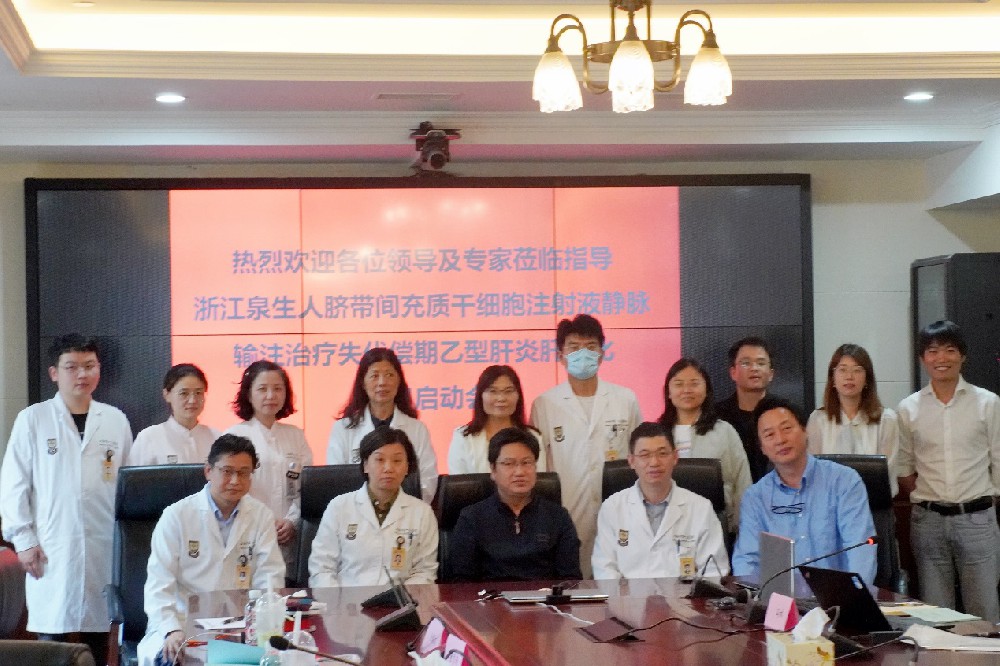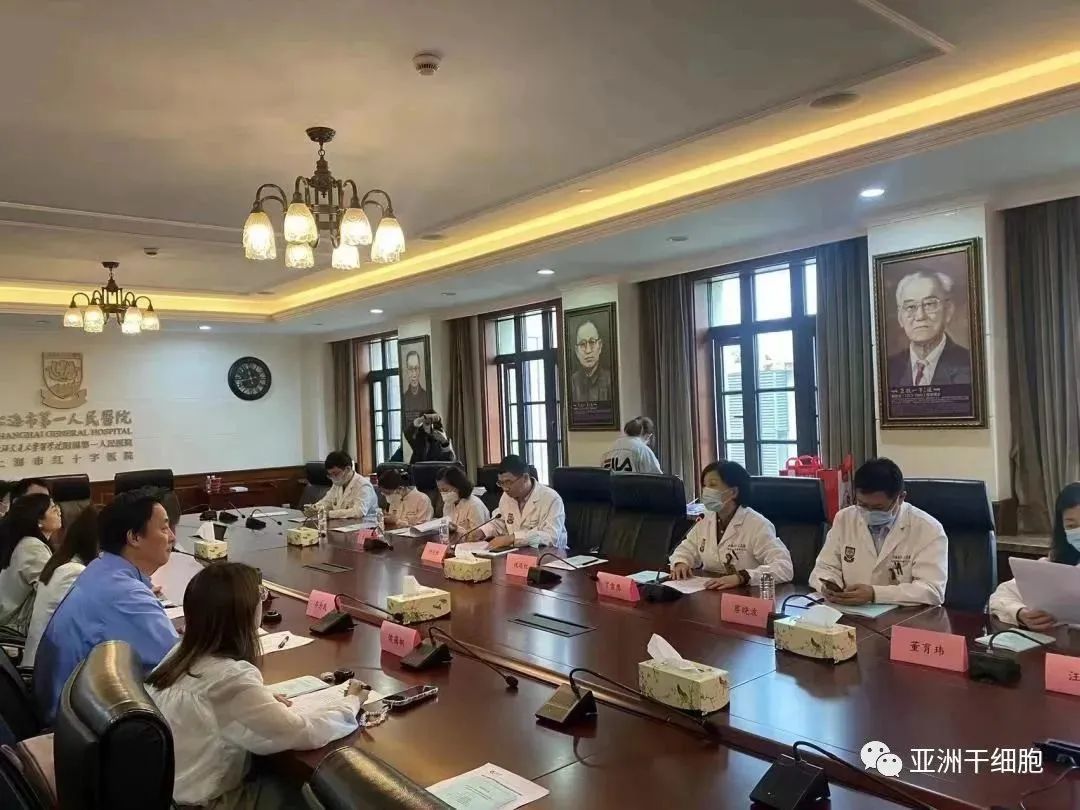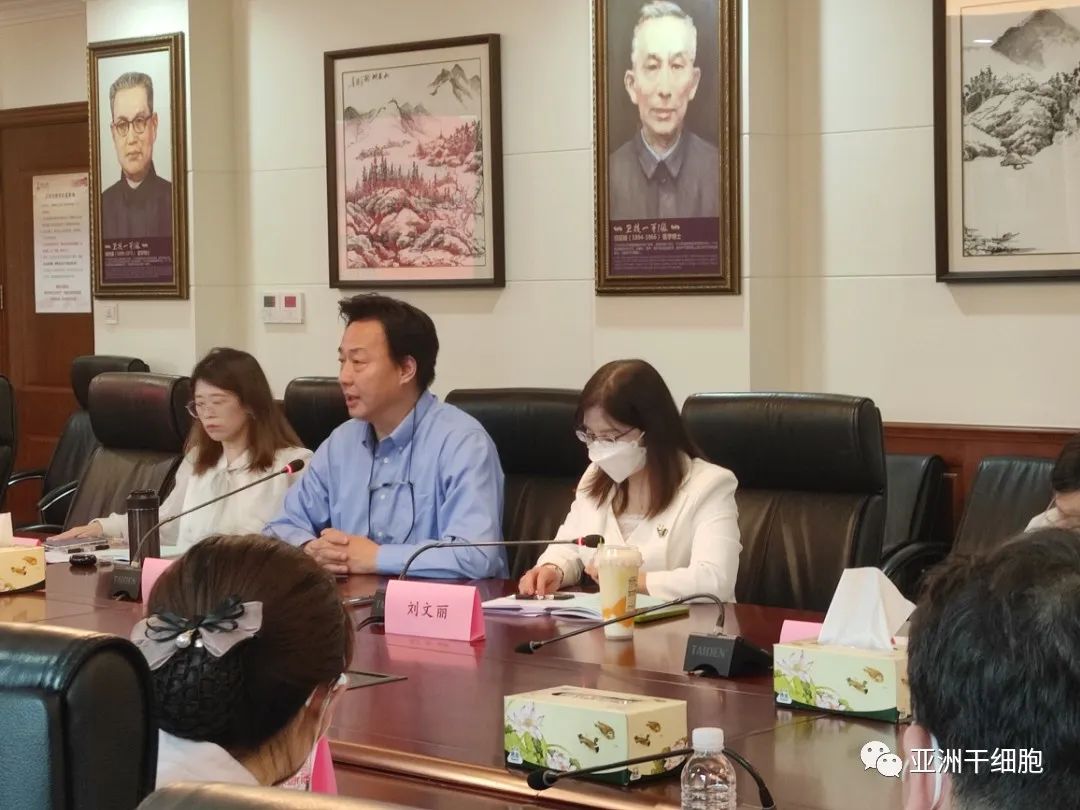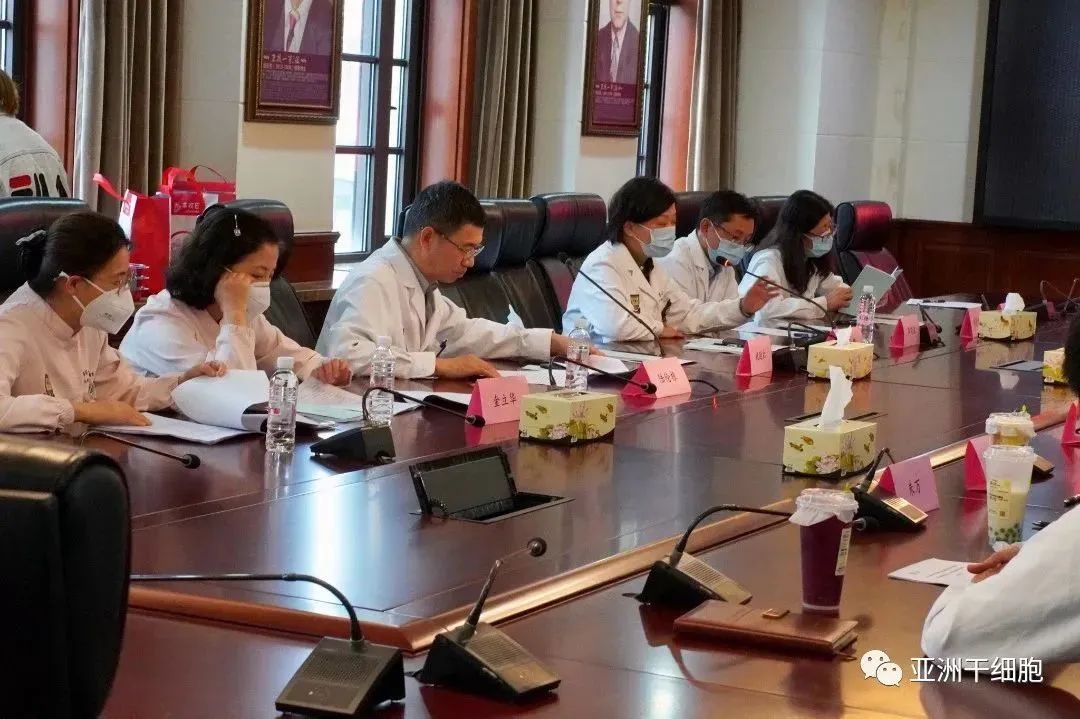The phase I/II clinical trial of human umbilical cord mesenchymal stem cells for the treatment of decompensated hepatitis B cirrhosis was officially launched in Shanghai General Hospital!
On May 24, 2023, the first phase I/II clinical trial of domestic human umbilical cord mesenchymal stem cells for the treatment of decompensated hepatitis B cirrhosis developed by Asia Cell Therapeutics (Zhejiang) Co., Ltd. (hereinafter referred to as "aCGT") was officially launched in Shanghai General Hospital. This milestone marks that innovative drug biotechnology companies from China are catching up to the international leading position on the journey of exploring innovative therapies for decompensated hepatitis B cirrhosis. Kick-off meeting attendees Director of the Scientific Research Department of Shanghai General Hospital Zhu Yanhong, Principle Investigator(PI) Director Lu Lungen, Director Ding Xueying, Director Cai Xiaobo and their research team, Professor Qi Nianmin, Chairman of aCGT, Clinical Director Liu Wenli and the clinical team, as well as CRO and SMO leaders and other relevant personnel attended the meeting. The kick-off meeting of Shanghai General Hospital is being discussed on the spot The site of the kick-off meeting On April 11, 2023, the project has been reviewed by the Ethics Committee of Shanghai General Hospital, the team leader unit, and held a project kick-off meeting at Shanghai General Hospital on May 24. Lu Lungen, Director of the Department of Gastroenterology, and Ding Xueying, Director of the Institutional Office, served as the PI of the project team leader. The kick-off meeting was presided over by Director Ding Xueying, who first welcomed and thanked all parties for their trust and efforts in the promotion of the project on behalf of Shanghai General Hospital, and expressed the hospital's great attention and support for the project. Then Director Lu Lungen and Chairman Qi Nianmin of the sponsor delivered speeches. In the meeting, everyone had a heated discussion and sorted out the details of the test process. At the end of the kick-off meeting, Director Zhu Yanhong made a concluding speech, thanking aCGT for choosing Shanghai General Hospital as the team leader of the clinical research of "Innovative Cell Therapy for Decompensated Hepatitis B Cirrhosis". Professor Qi Nianmin, Chairman of aCGT Director Zhu Yanhong, Director Lu Lungen, Director Ding Xueying and the team of Shanghai General Hospital Background of the project The decompensated stage of liver cirrhosis refers to the advanced stage of liver disease caused by various chronic liver damage, the huge patient base and serious disease hazards bring a great burden to people's health, and the existing treatment can help to delay the progression of the disease, but cannot reverse the decline of liver function in patients, and liver transplantation is limited by the lack of donor sources, so it is urgent to develop new treatment methods. Stem cells have biological functions such as tissue damage repair and immune regulation, and preliminary studies have shown that they can improve liver function indicators, fatigue, ascites and other symptoms in patients, and reduce inflammatory responses. The successful development of the first approved registered clinical trial of stem cell therapy for decompensated hepatitis B cirrhosis in China will help accelerate the standardization process of stem cell therapy for liver diseases in China and provide a safe, effective and affordable new clinical solution as soon as possible. aCGT is an innovative drug biopharmaceutical company dedicated to the research and development of stem cell drugs, and has obtained 4 IND trial approvals for new stem cell drugs in the fields of respiratory distress syndrome, ankylosing spondylitis, decompensated hepatitis B cirrhosis and second-thickness burns, ranking at the forefront of stem cell drug research and development in China. Mechanism of stem cell therapy for decompensated hepatitis B virus cirrhosis MSCs can exert local effects through paracrine function, provide nutrients and an environment conducive to proliferation and repair for the liver, promote the proliferation of damaged liver and liver vascular regeneration, inhibit the proliferation and migration of immune cells to the liver, and regulate the liver and systemic immune inflammatory response, thereby reducing liver damage. MSCs can induce the production of regulatory T cells (Tregs) by secreting IL-10, transforming growth factor β (TGF-β), prostaglandin E2, etc., inhibit excessive inflammatory response, reduce liver inflammation, improve liver microenvironment, inhibit hepatocyte apoptosis, and promote hepatocyte regeneration, inhibit the activity of hepatic stellate cells by secreting IL-10 and TNF-α, or promote the apoptosis of stellate cells through the Fas/FasL pathway, thereby inhibiting the formation of liver fibrosis. Up to now, there are no mesenchymal stem cell products for the indication of hepatitis B cirrhosis on the market at home and abroad. Scholars in the industry have carried out a large number of clinical exploration studies on stem cell infusion in the treatment of liver diseases, and the clinical data of stem cell infusion in the treatment of decompensated liver cirrhosis are accumulating. A large number of published research results suggest that mesenchymal stem cell infusion can improve the liver function indexes of patients, and after transplantation, the patient's appetite, mental and physical strength are significantly improved, abdominal distention, fatigue and ascites are significantly improved, the inflammatory response is significantly reduced, the Child-Pugh grade is reduced, the MELD score is significantly improved, and the quality of life is significantly improved. Subject recruitment initiated The kick-off meeting of the project "Clinical Trial to Evaluate the Safety, Tolerability and Efficacy of Human Umbilical Cord Mesenchymal Stem Cell Injection for the Treatment of Decompensated Hepatitis B Cirrhosis" was successfully held, marking the official launch of the project and the start of recruiting subjects, and the specific inclusion criteria are as follows: Inclusion Criteria Subjects must meet all of the following criteria: (1) 18 to 75 years old (including borderline values) at screening, regardless of gender (2) Diagnosed with decompensated hepatitis B cirrhosis according to the Guidelines for the Prevention and Treatment of Chronic Hepatitis B (2019 edition) (3) There's no significant reduction in cirrhotic symptoms or no significant improvement in quality of life score after more than 3 months of strict medical conservative treatment (4) HBV DNA ≤ 1000 IU/mL at the time of screening (5) Fully understand the informed consent form, voluntarily subject to the trial and sign the informed consent form. Exclusion Criteria: Subjects who meet any of the following criteria will not be allowed to enter this trial: (1) other causes of cirrhosis, such as alcoholic hepatitis, viral hepatitis C, autoimmune hepatitis and metabolic-related fatty liver disease (2) Child-Pugh score >12; (3) History of malignancy of the liver or other organs, or a family history of liver malignancy in three generations of immediate family members; (4) Current serious medical conditions that would affect your safety and treatment efficacy assessment as determined by the investigator, such as: Class II or higher abnormal cardiac function (NYHA criteria), cardiovascular disease such as ischemic heart disease (e.g., myocardial infarction or angina), poorly controlled diabetes (fasting glucose ≥ 10 mmol/L or glycated hemoglobin (HbA1c) ≥ 8%), serum creatinine > 2 times the upper limit of normal (ULN), etc; (5) Recent uncontrolled gastrointestinal bleeding (e.g., severe bleeding tendency or active bleeding within 3 months prior to screening, or clinically significant upper gastrointestinal hemorrhage event within 4 weeks prior to screening), as determined by the investigator to be unsuitable for participation in this trial; (6) Have had hepatic encephalopathy or hepatorenal syndrome within 3 months prior to screening (7) Spontaneous peritonitis or a more severe active infection within 2 weeks prior to the trial (8) Positive infectious disease test (serum anti-HIV antibody, anti-HCV antibody, syphilis antibody either positive) or active tuberculosis; (9) Those who have received human albumin within 3 weeks prior to the first infusion of the test drug; (10) Those who have the history of venous thrombosis or pulmonary embolism (11) Drug addicted or alcohol abusers; (12) Women who are pregnant or breastfeeding; (13) Persons with a history of severe drug allergy or hypersensitivity; (14) History of a serious mental disorder, including uncontrolled major depression or controlled or uncontrolled psychosis, within 24 months prior to screening; (15) Those who have participated in other interventional clinical trials within 3 months prior to screening or are participating in other interventional clinical trials, or who have received prior stem cell therapy (16) Those who are proposed for liver transplantation within 3 months; (17) Other conditions that, in the opinion of the investigator, are not suitable for participation in this clinical trial.


